A Conversation with Hlynur Pálmason & Elliott Crosset Hove (GODLAND)
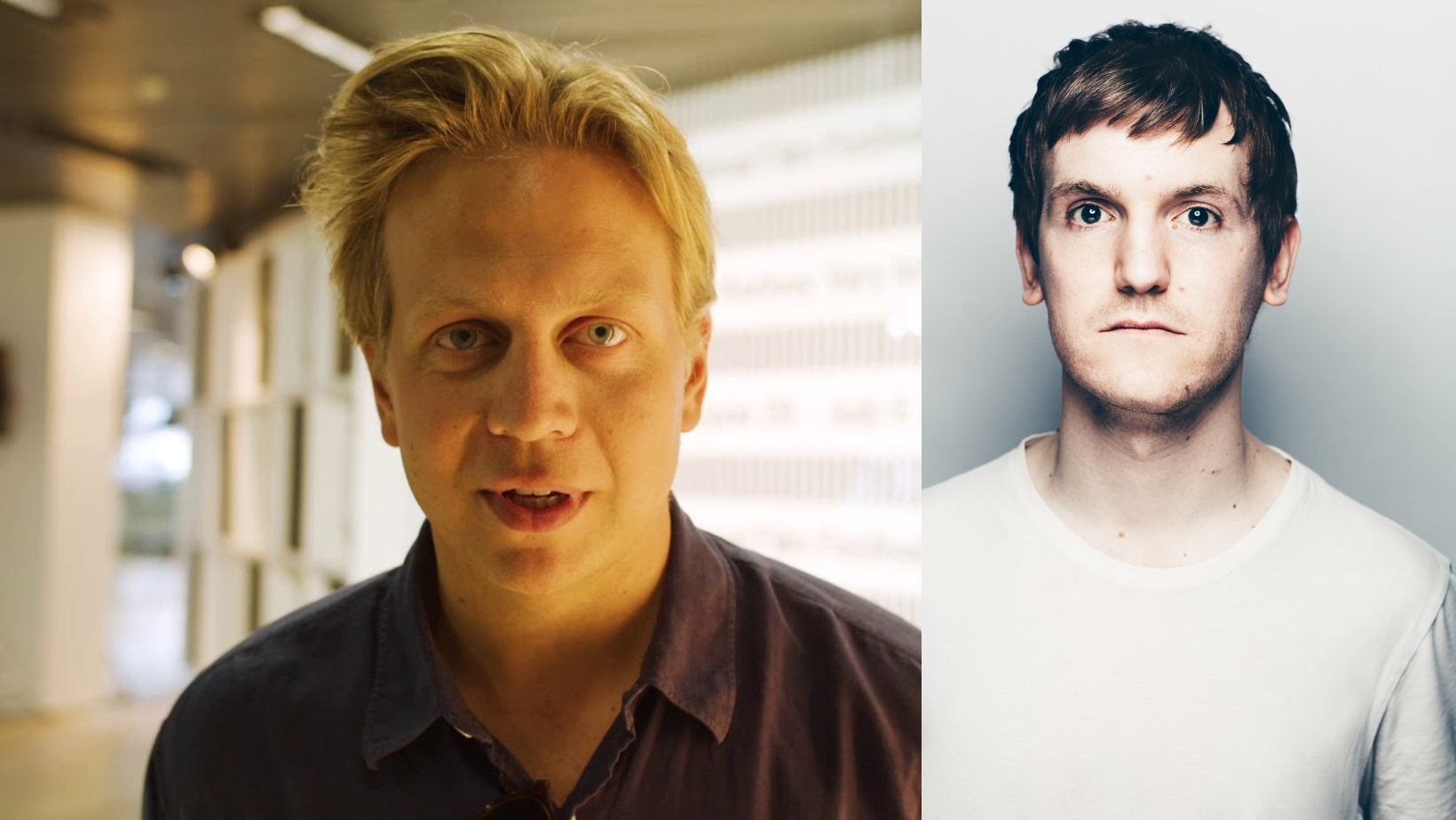
Hlynur Pálmason is an Icelandic writer and director. For his latest project Godland (which I also reviewed) he reunited with Danish actor Elliott Crosset Hove. Pálmason is a graduate from the national film school of Denmark. While Elliott is now an actor and has been working in features for over a decade, when he originally graduated college, he dreamed of being a writer and director himself. Pálmason’s first feature was released in 2017 and titled Winter Brothers. From that moment he was boosted into the upper echelon of European filmmakers. His next film, A White, White Day made a splash at the international critics week of the Cannes Film Festival in 2019. In 2022, he returned to Cannes, this time in the Un Certain Regard category with the masterful Godland. The film also was featured in the Toronto International Film Festival. I spoke with both endlessly talented men in this interview which has been edited for length and clarity.
Hammer to Nail: So, two things I noticed right off the bat, is the aspect ratio and the cinematography, which is clearly shot on film. For Hlynur I am wondering why you decided on these aesthetics for the film? Are you a film purist? And for Elliott I am wondering what it is like acting while being shot on film vs digital and working within this tight frame of 1:3:3?
Elliott Crosset Hove: It is very special to act on film! For me, personally, before becoming an actor I wanted to make films myself. I have always had this romantic vision of working with film. I was very lucky to do it when I started working with Hlynur. I had a part in his graduation film ten years ago and then in his first feature film six years ago. It is wonderful! As an actor specifically, it does not help your nerves because you do not have limitless takes. I think what it does is that it helps your concentration, your respect for the medium and for the film. It helps you stay on point. I cannot think too much about it because then you can become locked. I think it is really healthy. Also, in life today, in culture we can always do another one. If something breaks, yeah I will get another one. Here, it is really nice that we have this amount of film and that is what we have so you better make it matter. It helps my concentration. It helps me to really want to contribute. It is very cool in close ups to hear the actual film, that really humbles and scares you.
Hlynur Pálmason: You would think that it is because of Lucas’ camera, which is an 8 x 10 inch wood plate camera. Which is almost identical to the 1:3:3 Academy format we have. It is not exactly but it is pretty close to it. It is actually not that, that was more of a pleasant surprise. A couple of years ago, probably 2013, right around when I started writing the film, I was doing film tests and I was trying a new format, the old academy format. I really connected to it, It felt very natural to frame certain images. I felt very excited to move the camera. I had some issues shooting in super 35, the wider format, which is basically a much smaller format, but it’s wide. I do not feel like it captures landscapes well. There is something about framing faces or people that I don’t like so I fell in love with the old Academy. I probably will shoot everything now in the old academy because it just feels so natural.
HTN: Well it was a great choice, especially for this film, I loved the visuals. As the text says at the beginning of the film, it is inspired by the earliest photos of the southeast coast. How did you come across these photos and when did you decide to turn this into a film?
HP: It started in 2013, I was already writing something. I had talked with Elliott and he had visited me in Iceland. It was written for Elliott. The first 2-3 years, the whole writing process felt a little bit stiff. I do not know if it was because I felt a little bit out of my depth going historical, going back in time. When I started exploring these two countries I had a problem of finding stimulation or excitement. I felt stiff. But then I made up this fictional thing which was these negatives. Then I started thinking to myself what if I found these negatives, who would be these people that he photographed. What kind of situation would be with him, was it a photograph of a girl? What was the set up? Was it an intimate moment or was it just a random image of a landscape? I started imagining this stuff and it really boosted the process of the film and kicked it to life. Some people believe it is the truth, some do not, but I never tried to hide it, it is part of the fiction.
HTN: Wow, got it. Very cool. Elliott, what about this script and character was so intriguing to you?
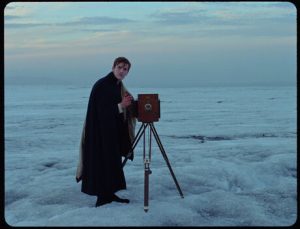
Elliot Crosset Hove in GODLAND
ECH: First of all it was very intriguing to have the chance to work with Hlynur again. No matter what it was, it would have been intriguing. But, this story and this script, it was the downfall of this seemingly good man. Well educated, religious, on paper at least, wanting to do good, what happens when he morally succumbs? That I think is really Intriguing. I am also Danish and so is the priest. What happens to a person who has the self image of being good, right, knowledgeable and empathetic when they are confronted with their lust, not knowing everything and by other people that know more than he does. He cannot accept that. What happens when he feels all of these conflicting emotions that he does not identify himself with. He has two choices, either he can embrace it and accept the fact that he is human and therefore has many different emotions and is full of flaws or he can hold onto the idea that he is a priest and he is coming with the voice of god, on behalf of denmark and therefore I am right and good. That was really intriguing to me. In earlier versions of the script, some of these emotions and this inner turmoil was more graphic and violent. That was also very intriguing. It was not the actual acts of violence, but, more the essence. I really really liked the character.
HTN: Barriers of language is clearly a prominent theme in the film. For both of you, what was it about that topic that you were excited to explore?
HP: Being from one country and living in another country you sometimes become an alien in between these two countries. I felt like when I moved to Denmark I did not feel like myself. When you are learning a language it can be hard to be yourself. You are trying to be funny again, you’re trying to be a person. There is a lot of miscommunication and misunderstanding. This was something that I really wanted to explore. When I started reading about this history between Iceland and Denmark it fascinated me. Iceland was under the Danish crown and in 1918 we got independence and then full independence in 1944. We used the war to get independent. I was just interested in the idea of social misunderstanding. The whole film is filled with opposites. You know, like Denmark and Iceland, the languages there, even the characters, Lucas and Ragnar are quite large opposites. I liked creating drama with these opposites. I have always been interested in contrasts. When I see opposites and contrasts hitting each other. We worked drama through that.
HTN: Yes, the interactions between Ragnar and Lucas is definitely one of my favorite aspects of the film. Many people, including Janus Films on twitter, have called this film “Herzogian” are you influenced by Herzog? Elliott, did you watch any films or read any books to prepare for the role?
ECH: Yes. I watched a lot of films. Apocalypse Now, There Will be Blood, Doubt, The Godfather 2, Silence, and Fitzcarraldo,
HP: Did we talk about films? I don’t remember.
ECH: No not that much.
HP: I remember we watched The Dictator at home.
ECH: Yes, that was amazing.
HP: I do not remember us seeing any other films together, I think it was more you had your process and I had mine.
HTN: So was Herzog a formative influence like Janus Films claims it is on Twitter?
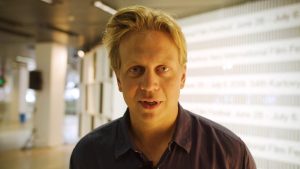
Hlynur Pálmason
HP: I think the energy and the way Werner Herzog made his films, Especially Aguirre the Wrath of God and Fitzcarraldo. There is this energy in the process of making the film that I believe in a lot. I believed that our process and our energy would be something that colors the film. I think we planned the film that way. Yes, let’s shoot the film chronologically, let’s go on this journey together, let’s hike the mountains etc. It is very far away from the studio system of filmmaking. Our film is very homemade. What I like about Werner Herzog is that it never feels like his films are preconceived for a market. The films are what they want to become. We just follow the film and allow it to be whatever it wants. I think you can feel that when you watch one of those travel films. I think that is probably the thing that people are talking about.
HTN: The film definitely has some funny moments. Overall though, it has a serious and hypnotic tone. What is the vibe like on a set like this? It is shot on location in pretty intense conditions. Are you guys having fun or is it more of a serious artistic approach?
ECH: I think we are having fun. I think it is a very respectful, caring and low key set. Everyone is there because they want to be there. We don’t know what exactly awaits us, but we do know what awaits us. We know it is going to be a journey and also tough. We want it to be like that. I do not think we can make it without it being tough. Therefore, we also take care of each other. The majority of the people working on the films, you have worked with before. The thing about Hlynur is that he is a great serious artist but he is not like that in an everyday situation. He is also a very normal and kind person. That really influences the set. There is great respect for each other’s craft and responsibilities. Of course there are always discussions on the premise of the film that we all want to do the best for. It is lovely. People would be surprised by how low key it is.
HTN: That is surprising because it is such a grand film.
HP: It was basically shot around my house. It is very low key. All the things Elliott says are true. We are surrounded by family and friends and we are shooting on locations that are not really locations; they are just places that I know really well. Even the horse that he is riding is my father’s horse. The extras are our children. It is all extremely low key and homemade. I think there is an energy that comes from that. I think it depends on who watches the films but, I think there is a lot of humor in the film. Sometimes when you watch a film that is serious, you do not really know if you are supposed to laugh or not. I always liked that area where the audience does not know how they are supposed to feel. I always enjoyed being there myself. I think there is humor in it, but also, a temperament. We take it seriously, but hopefully, not too seriously. I really do not like that kind of thing.
HTN: What is your screenwriting process like? Do you have a routine or is it more sporadic? You spent a lot of time on this script.
HP: For me, I feel like I am so new to this. I have worked with visual and audio ever since I was 13. With these three features I have been doing, short films, video installations, and paintings it all happens parallel. I really just try to enjoy the day and have some fun doing the things that I want to do. I am filming every week, always developing a couple of projects and testing things out. It is like an artist in a studio. Testing, trying, reading, reacting, and I am lucky to have an assembly. Elliott is someone who immediately when I saw him, I fell in love with him. I went directly up to him and told him that I wanted to work with him. Even now, when we just finished Godland, we are already talking about another project in the near future. Since film school I have been trying to figure out how I want to live my life. Like normal life, everyday life. How do I want to work? How can I be creative and have space to be creative while also being with family and friends? It is more practical stuff like that, it sounds silly maybe, but, it is just trying to figure it out.
HTN: Well the process definitely worked out for this film. For Elliott, I feel like the biggest moment for your character is the first time you give your sermon in the built church. Unfortunately for him, it turns out to be a colossal failure. Tell me about your preparation for this moment and the emotions you were trying to communicate. I found the subtleties in your performance to be next level.
ECH: Thank you so much! That I can thank Hlynur for a lot.
HP: That is not true Elliott because I did not do anything. That is the truth. It’s great that you talk about this moment. It is really one of my favorites also. That was one of the scenes that I really thought about for a long time. I was always thinking, how does his voice sound? When you shoot a film chronologically like that, it is almost as if the actors grow into their roles. They grow into the character. It was so funny when we started recording and Elliott started talking I was like, “yes!” It sounded exactly like, or even better than I hoped it would.
ECH: Shooting chronologically really helped us a lot. It really helped me a lot because of the journey. It is kinda a contradiction that he is going to stand there after what he has been through and still hang onto the idea that he is right. You listen to me. It is pathetic and yet he hangs onto it. He will not let go. It was very important to me to do my job as an actor and know the words very well. Throughout the shoot, on the weekends, I worked especially on this part. Lucas does not say many words throughout the film. When he suddenly does in this scene, it is about being ready for it. I was pretty much just trying to enjoy it and listen to Hlynur.
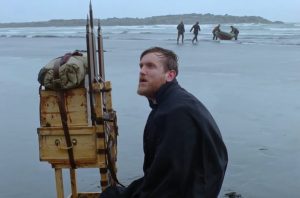
A still from GODLAND
The first two takes I did, I was a bit too dramatic and then we took it completely down and that felt really right. We can do that because we have gone through everything before to get to this moment. Of course, I am an actor, so I have to be able to do scene 70 on day 2 but, it is a big privilege not to have to do that. Late church scene in the late part of the shooting. In a way it was just being present and kinda enjoying it. It was also a really fun character to play because he means so much to me. I can recognize a lot of myself in him and also a lot of what I do not like about the world or my own country in this character. He is very human because he is so flawed. It was wonderful. I was so very nervous before. In the morning I felt like, “Ok it is a big day.” Also, by that time, we are all so familiar with each other, in a way it is just going up there and doing it and then listening to any comment there might be. It was a relief also to do it. Especially the part where he comes out and falls in the mud. It is a small moment where he lets go and acknowledges that he lost.
HTN: It is a great moment. Another really important stretch in the film is from the 28 minute mark to the 33 minute mark. For Hlynur I am wondering why this story is being told in this moment and for Elliott I am wondering how do you feel your character transforms in this moment as he takes off his shirt and embraces nature as well as shaves his face which he will leave shaved for the rest of the run time.
HP: It was a strange place when I was writing it. I accepted that and just went with it. This was something I was very excited about. Hearing a voice and getting into a specific atmosphere. Them traveling together into the valley. Even in the script phase it was thought of as being together and edited in that way. I think it is the part of the film that me and Julius, my editor, worked for the longest time on just getting it right. It was really hard to get the balance right. The story is in a way quite mysterious. I was in doubt sometimes. Even my actor was like “woah ok, this is a story.” We were trying to figure out what it was and it was not until we worked on the edit for very long that it suddenly came together. For a long time it was hard to put the pieces together. Suddenly it came together. Often for me, cinema can be like music or a rhythm. You just get stimulated and you do not know why. When I was writing it I felt like it had a fragile nature that was really beautiful. I thought, let’s just give it all the love we can and it will grow into something interesting and beautiful. So, yeah, it did all kinds of things. It really does go into a specific atmosphere that I needed to go into.
ECH: I think there are two sides to it. There is the character’s point of view and the film’s point of view. For the character he has found intimacy with the translator. He trusts him because the translator accepts their relationship that Lucas is in charge. He likes the translator and feels safe with him. There is something erotic about it. Something that is awakened inside of Lucas that he is nowhere near accepting. He feels comfortable and safe with the translator and therefore he can allow him to do such an intimate thing as shave him. Then there is the other layer that Lucas is gradually being peeled down throughout the film. First, it is the beard, then he loses quite a lot of weight and hair during the trip. He is being Peeled down to almost nothing. Which he essentially is, almost nothing. In a way he is also everything. I don’t know haha.
HTN: Well, again, thank you so much for taking the time to do this. I really thought the film was amazing. I commend you guys to keep creating and inspiring people like me who want to make films in the future. It really was a special film.
HP: Thank you so much.
ECH: Thank you! It was nice to meet you too.
– Jack Schenker (@YUNGOCUPOTIS)
Janus Films; Hlynur Pálmason, Elliot Crosset Hove; Godland movie review

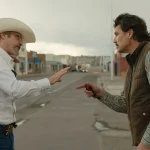
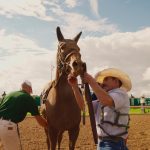





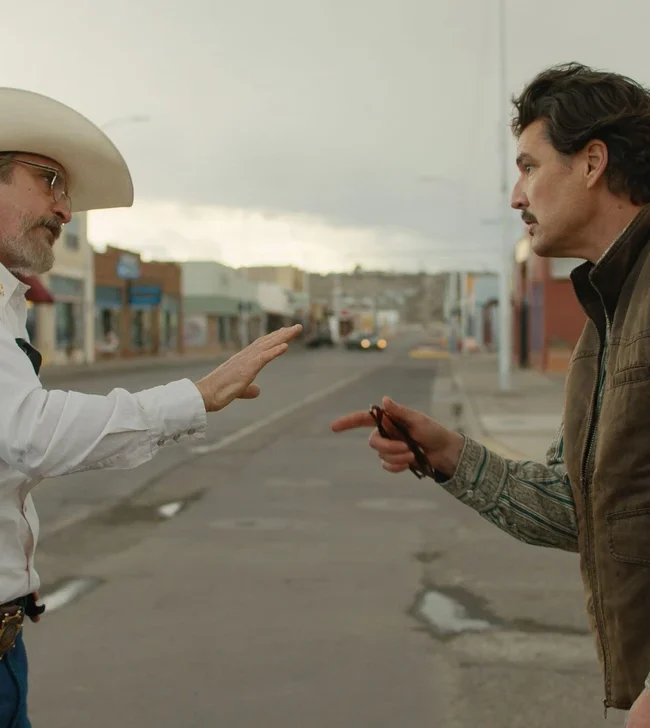
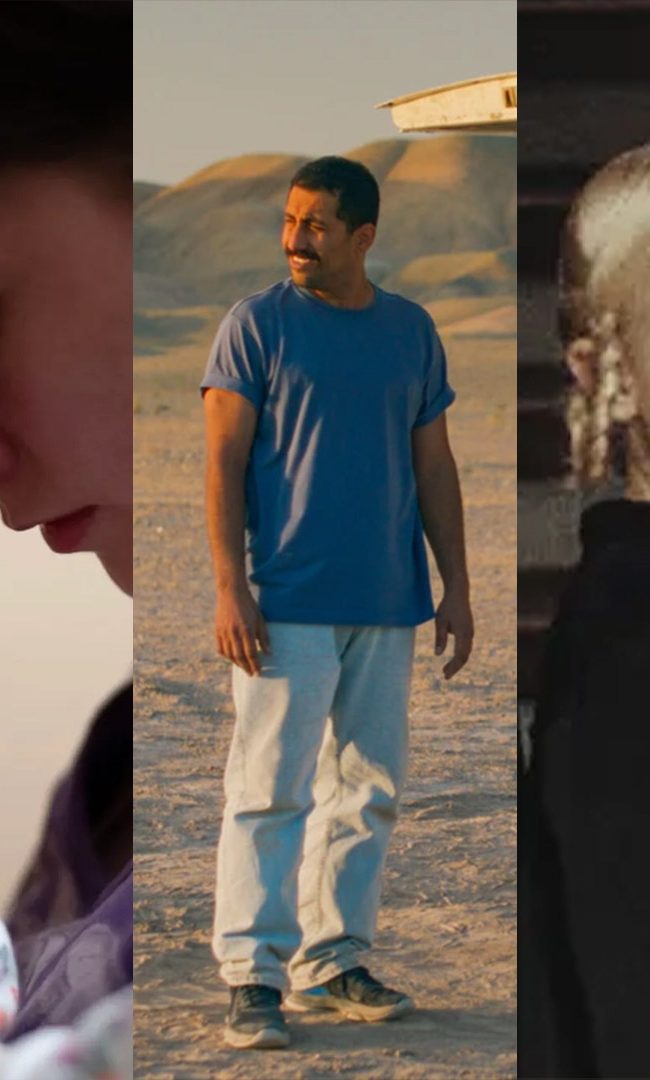


Shane Sweitzer
This is one of those films where hearing from the director and actors is almost as intriguing as the film itself. Thank you Jack for extracting the information needed for understanding why this film is so powerful!